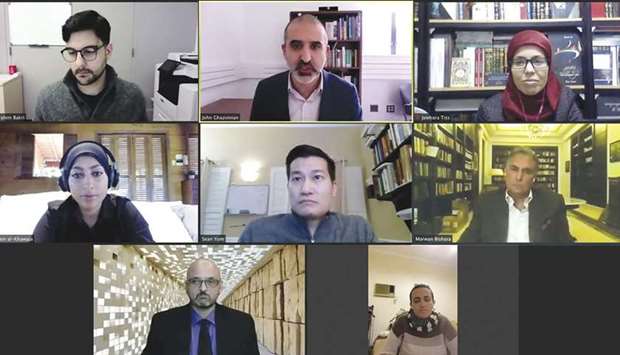The wave of uprisings that swept across the Arab world a decade ago – from Tunisia to Syria – are proof that tangible change requires sustained effort and that a decade is a “blip in the deep time of revolutions,” according to Northwestern Qatar dean and CEO Marwan M Kraidy.
Speaking at The Arab Spring: Ten Years Later, a webinar hosted by the Middle East Centre at the University of Pennsylvania, Kraidy was featured alongside journalists and political analysts from the region, including Bahraini human rights activist Maryam al-Khawaja, Egyptian journalist Lina Attalah, political analyst Marwan Bishara, and Tunisian activist Jawhara Tiss on the panel.
Throughout the session, Kraidy highlighted what research on these events – from the initial outbreak of the mass protests to the toppling of governments in major Arab countries – had created repercussions that continue to redraw the Middle East’s geopolitical map and affect the region’s influence on global debates related to media and technology.
According to Kraidy, revolutions go through an evolutionary cycle, where organised groups overtake the influence and control from members of the public who initiated the movement to transform the energy of revolutionary action into institutionalised political influence.
When examining the struggles of the movements in Egypt, Bahrain, Syria, Libya, and Yemen, Kraidy noted that the public failed to complete the revolution cycle and dismantle the autocratic systems’ deep roots.
Kraidy also suggested that foreign policies were instrumental in disenfranchising and weakening the protesters. He explained, “We are talking about these revolutions as if the only forces that were part of the Egyptian revolutions were Egyptian, or in Tunisia were Tunisian,” whereas regional and foreign interventions and external factors played a significant role in determining the outcomes of these movements.
While the results of the protests varied from country to country – with Tunisia being the prime example of a successful revolution and Syria a failed attempt at removing the regime – Kraidy explained that “there are regional systems and a global political economy that are very important to examine in order to understand why some revolutions succeeded while others did not.”
Highlighting the critical role of media in the early days of the Arab Spring, Egyptian journalist Lina Attalah said that independent publications like Mada Masr were at the forefront of the civil society movements as they covered key events of the revolutions and mobilised protesters across cities.
Amid the shifting geopolitical landscapes, Kraidy concurred with the other panellists that this is a critical time for the Middle East and that the Abraham Accords and Gulf reconciliation schemes will determine the region’s political stability.

Screenshot of the panellists at the webinar.
